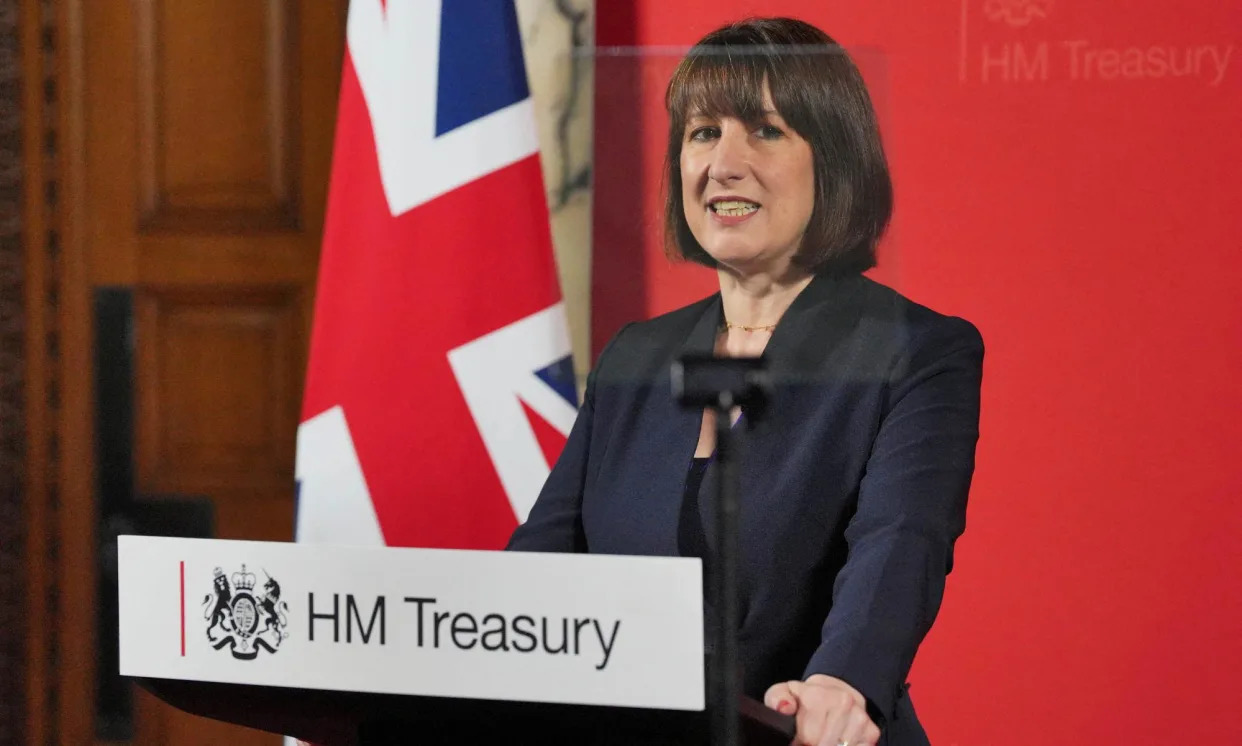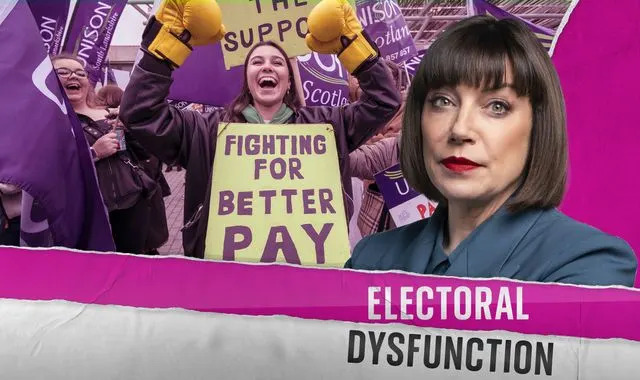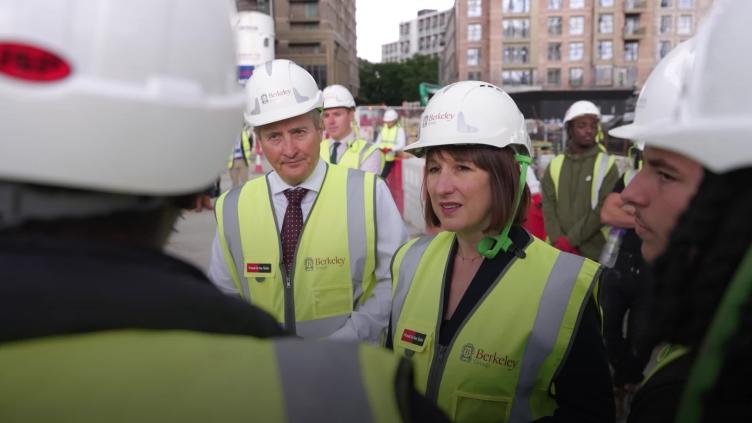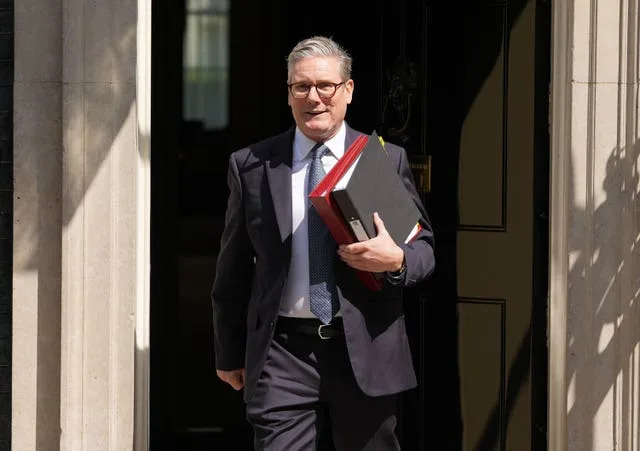Rowena Mason Whitehall editor
THE GUARDIAN
Fri, 26 July 2024

The chancellor, Rachel Reeves, has said there is ‘a cost to not settling’ negotiations.
Fri, 26 July 2024

The chancellor, Rachel Reeves, has said there is ‘a cost to not settling’ negotiations.
Photograph: Jonathan Brady/Reuters
Millions of public sector workers are set for an above-inflation pay rise due to be announced by Rachel Reeves next week after more than a decade of austerity.
The chancellor is expected to accept the recommendations of public sector pay bodies for pay increases on Monday – a move economists believe could cost up to £10bn.
The NHS and teaching pay bodies are reported to have recommended a 5.5% rise, and similar advice is likely to have been given by other pay review bodies, covering workforces such as doctors and dentists, armed forces, prisons and police officers.
The pay rises would help reverse years of declining wages, deal with staff shortages and see off the threat of industrial action.
Reeves is expected to confirm the increases as she sets out her case on Monday that the Conservatives left the government with a dire economic inheritance, including a black hole of £20bn.
Despite the difficult economic circumstances, she is expected to make the argument that the pay rises are necessary to avoid the costs to the economy seen in the waves of strike action under the Conservatives.
As part of the process, Reeves asked for an analysis from Treasury officials on the cost to the economy of industrial action, with the strikes of 2022 and 2023 having a knock-on impact on productivity.
This is understood to have found that every day of the teachers’ strikes cost the economy £300m because of lost working hours, while industrial action in the NHS cost £1.7bn in total to the taxpayer.
The cost of giving pay rises to public sector workers has not been fully budgeted for in current spending plans, but the money will have to be found through existing headroom, changes to fiscal rules or tax rises in the budget.
Before the election, Reeves had refused to say whether public sector workers would get a pay rise, saying she would need to look at the books before deciding.
But more recently, she hinted the government could be prepared to accept the advice of the pay bodies, saying there is “a cost to not settling” negotiations.
After a year of industrial action from 2022-23, most of the unions accepted pay deals with the Conservative government. However, Wes Streeting, the health secretary, is negotiating with junior doctors in an attempt to bring an end to their long-running industrial dispute.
Unions had warned of the likelihood of industrial action if the government were to ignore the advice of the independent pay review bodies.
Daniel Kebede, the general secretary of the National Education Union said last week: “It would be highly problematic for the Treasury to then intervene and then not implement a 5.5% pay award [if that is the recommendation].
“We absolutely would want to avoid strike action, but that would almost seem inevitable if the Treasury were to make such an intervention.”
In her statement to the House of Commons on Monday, Reeves will confirm the date of the budget, which is expected to be in the second half of October or November, and plans for a spending review.
She will also highlight some of the immediate pressures in areas such as the asylum system, prison places, welfare, defence and local council – and how the government intends to tackle them in the short term.
Economists have predicted Reeves will “kitchen sink” the bad news about the economy. The review is likely to conclude that existing spending plans are unsustainable and would require substantial cuts to public services, a position that economists had highlighted repeatedly before the election.
Presenting her Treasury audit to the Commons on Monday, the chancellor is expected to say her review has revealed state and privatised services are at risk of collapse under current plans.
Further billions are also committed in schemes like compensation for victims of the infected blood scandal and of the Horizon failures at the Post Office. The Cabinet Office minister, Nick Thomas-Symonds, told the House of Commons on Thursday that final compensation payments to patients infected with contaminated blood products and bereaved partners will begin to be made by the end of this year.
A higher than expected rise in public sector pay will put additional pressure on the public finances under Reeves’ self-imposed fiscal rules. The Institute for Fiscal Studies has estimated that if there were a 5.5% increase across all public sector professions, it would cost about £10bn.
Reeves has said the government will borrow only to invest within its fiscal rules, and that overall public debt should fall year-on-year as a share of gross domestic product by the fifth year of official forecasts.
Details of any taxation changes to meet the costs of extra public spending will not be outlined until the budget, but Reeves has little wriggle room having ruled out raising VAT, income tax or national insurance during the election.
The Guardian previously revealed in June that Labour has been drawing up options for raising wealth taxes. This includes a hike in capital gains tax (CGT) that could raise as much as £8bn.
Other changes being weighed include a rethink of inheritance tax that would require more stringent tests for “gifting” of assets such as farmland, which can currently be passed on tax free.
Added to the CGT changes, the measures together could raise more than £10bn. Draft analysis on the likely revenue raised and the consultation processes required were circulated among Labour insiders before election day and shared with senior government officials.
The head of Unite, Sharon Graham, has already been applying pressure on the government to change its fiscal rules so it can borrow more to invest in infrastructure and public services.
The union leader told Reeves that people “haven’t got time to wait for growth” after Labour put boosting economic output at the heart of its plans to repair the country’s finances.
Ministers expected to approve pay rises for all public sector workers, Sky News understands
Millions of public sector workers are set for an above-inflation pay rise due to be announced by Rachel Reeves next week after more than a decade of austerity.
The chancellor is expected to accept the recommendations of public sector pay bodies for pay increases on Monday – a move economists believe could cost up to £10bn.
The NHS and teaching pay bodies are reported to have recommended a 5.5% rise, and similar advice is likely to have been given by other pay review bodies, covering workforces such as doctors and dentists, armed forces, prisons and police officers.
The pay rises would help reverse years of declining wages, deal with staff shortages and see off the threat of industrial action.
Reeves is expected to confirm the increases as she sets out her case on Monday that the Conservatives left the government with a dire economic inheritance, including a black hole of £20bn.
Despite the difficult economic circumstances, she is expected to make the argument that the pay rises are necessary to avoid the costs to the economy seen in the waves of strike action under the Conservatives.
As part of the process, Reeves asked for an analysis from Treasury officials on the cost to the economy of industrial action, with the strikes of 2022 and 2023 having a knock-on impact on productivity.
This is understood to have found that every day of the teachers’ strikes cost the economy £300m because of lost working hours, while industrial action in the NHS cost £1.7bn in total to the taxpayer.
The cost of giving pay rises to public sector workers has not been fully budgeted for in current spending plans, but the money will have to be found through existing headroom, changes to fiscal rules or tax rises in the budget.
Before the election, Reeves had refused to say whether public sector workers would get a pay rise, saying she would need to look at the books before deciding.
But more recently, she hinted the government could be prepared to accept the advice of the pay bodies, saying there is “a cost to not settling” negotiations.
After a year of industrial action from 2022-23, most of the unions accepted pay deals with the Conservative government. However, Wes Streeting, the health secretary, is negotiating with junior doctors in an attempt to bring an end to their long-running industrial dispute.
Unions had warned of the likelihood of industrial action if the government were to ignore the advice of the independent pay review bodies.
Daniel Kebede, the general secretary of the National Education Union said last week: “It would be highly problematic for the Treasury to then intervene and then not implement a 5.5% pay award [if that is the recommendation].
“We absolutely would want to avoid strike action, but that would almost seem inevitable if the Treasury were to make such an intervention.”
In her statement to the House of Commons on Monday, Reeves will confirm the date of the budget, which is expected to be in the second half of October or November, and plans for a spending review.
She will also highlight some of the immediate pressures in areas such as the asylum system, prison places, welfare, defence and local council – and how the government intends to tackle them in the short term.
Economists have predicted Reeves will “kitchen sink” the bad news about the economy. The review is likely to conclude that existing spending plans are unsustainable and would require substantial cuts to public services, a position that economists had highlighted repeatedly before the election.
Presenting her Treasury audit to the Commons on Monday, the chancellor is expected to say her review has revealed state and privatised services are at risk of collapse under current plans.
Further billions are also committed in schemes like compensation for victims of the infected blood scandal and of the Horizon failures at the Post Office. The Cabinet Office minister, Nick Thomas-Symonds, told the House of Commons on Thursday that final compensation payments to patients infected with contaminated blood products and bereaved partners will begin to be made by the end of this year.
A higher than expected rise in public sector pay will put additional pressure on the public finances under Reeves’ self-imposed fiscal rules. The Institute for Fiscal Studies has estimated that if there were a 5.5% increase across all public sector professions, it would cost about £10bn.
Reeves has said the government will borrow only to invest within its fiscal rules, and that overall public debt should fall year-on-year as a share of gross domestic product by the fifth year of official forecasts.
Details of any taxation changes to meet the costs of extra public spending will not be outlined until the budget, but Reeves has little wriggle room having ruled out raising VAT, income tax or national insurance during the election.
The Guardian previously revealed in June that Labour has been drawing up options for raising wealth taxes. This includes a hike in capital gains tax (CGT) that could raise as much as £8bn.
Other changes being weighed include a rethink of inheritance tax that would require more stringent tests for “gifting” of assets such as farmland, which can currently be passed on tax free.
Added to the CGT changes, the measures together could raise more than £10bn. Draft analysis on the likely revenue raised and the consultation processes required were circulated among Labour insiders before election day and shared with senior government officials.
The head of Unite, Sharon Graham, has already been applying pressure on the government to change its fiscal rules so it can borrow more to invest in infrastructure and public services.
The union leader told Reeves that people “haven’t got time to wait for growth” after Labour put boosting economic output at the heart of its plans to repair the country’s finances.
Ministers expected to approve pay rises for all public sector workers, Sky News understands
Sky News
Updated Fri, 26 July 2024

The government is expected to agree to above-inflation pay rises for public sector workers in the coming days, amid concerns over the costs of not settling, Sky News understands.
Independent pay review bodies have already recommended the above-inflation figure to ministers for teachers and nurses of about 5.5% to keep them in line with increases in the private sector, reports have suggested.
Sky News' political editor Beth Rigby understands Chancellor Rachel Reeves will likely sign off on the independent recommendations as early as next week for all public sector staff, despite the Institute for Fiscal Studies warning such a rise could cost an extra £10bn on top of the 3% rise ministers have reportedly already budgeted for.
Speaking on her Electoral Dysfunction podcast, Rigby said government sources were worried about the other costs of not agreeing to the pay review bodies' recommendations - namely industrial action from the unions.
Politics latest: Mel Stride joins Tory leadership race
"[It would be] noise around a new government that they don't want, [especially] when they criticised the Conservatives so much for not settling on pay deals," she said.
A Whitehall source told Rigby they would be "very surprised" if the Treasury doesn't accept the pay recommendations given the risk of industrial action if the government refuses.
It comes as Ms Reeves is expected to reveal a black hole in the public finances of around £20bn next week.
The last government was plagued by strike action over public sector pay after the soaring inflation following Liz Truss' mini-budget, with nurses, doctors, teachers and rail workers among the many sectors who downed tools.
While ministers eventually agreed deals with most of the unions, junior doctors and some rail workers are continuing to fight for better pay and conditions.
Speaking on Friday to broadcasters, Ms Reeves said not settling a pay dispute "also has costs" - highlighting the "huge costs" of past industrial action.
"We want to settle that industrial action and to draw a line under it," the chancellor added.
During the election campaign, Labour promised to get to the negotiating table straight away if they won, and Health Secretary Wes Streeting has already held meetings with the British Medical Association, while Transport Secretary Louise Haigh is in discussions with the Aslef rail union.
But both Ms Reeves and Prime Minister Sir Keir Starmer have warned of their "inheritance" from the Conservatives, claiming the public purse is in an even worse state than they first thought.
Ms Reeves is due to give a speech to parliament next week outlining the state of the economy, and her plans to tackle it.
This is also when she could announce her decision on public sector pay.
As of March this year, there were 5.95 million public sector workers in the UK, according to the Office for National Statistics (ONS).
Read more:
Labour rebels 'totally out of order', says Harman
The powder keg of prisons is now Labour's responsibility
Speaking to Sky News' Sunday Morning With Trevor Phillips, the Exchequer Secretary to the Treasury James Murray said he would set out the position of the government "in the context of the public finances and the public spending inheritance that we have".
But hinting at accepting the 5.5% figure, Mr Murray said: "Let's be clear, there is a cost obviously to the response to the pay review bodies' recommendations."
"But... there is also a cost to not striking a deal because you then run the risk of industrial action, there are longer-term problems in terms of recruitment and retention of teachers, of people who work in the NHS, police officers and so on. So we need to set out our way forward."
Mr Murray added: "The proper process is to consider the pay review bodies' recommendations and then set out our response in light of the public finances and the public spending inheritance."
Reeves expected to approve inflation-busting pay hikes for public sector workers
Sophie Wingate, PA Deputy Political Editor
Fri, 26 July 2024 at 3:51 pm GMT-6·4-min read

Rachel Reeves is expected to approve above-inflation pay rises for millions of public sector workers next week, amid concerns over the cost of further industrial action if the Government refuses.
The Chancellor is set to respond to the recommendations of independent pay review bodies on Monday, when she will also argue in Parliament that the Tories left Labour with a dire spending inheritance, including a £20 billion black hole.
She could reportedly also announce delays to a string of major capital projects to plug the shortfall.
Teachers and some 1.3 million NHS staff could be in line for a 5.5% pay boost, which could cost about £3.5 billion more than had been budgeted for.
Economists believe this could rise to about £10 billion if other pay review bodies give similar advice on workforces such as police and prisons officers and doctors and dentists.

Prime Minister Sir Keir Starmer has highlighted the dire state of the public finances (Lucy North/PA)
Sir Keir Starmer has previously acknowledged there would be a cost if failing to follow the recommendations of the pay review bodies led to a fresh wave of industrial disputes in the public services.
Labour did not deny reports that Ms Reeves could on Monday make the same argument as she signs off on the pay increases despite the shortfall in Government funding plans.
The findings of a Treasury spending audit she will detail will reveal “the true scale of the damage the Conservatives have done to the public finances”, a Labour source said.
An early assessment has reportedly found a nearly £20 billion annual gap between revenues and funding commitments.
Public sector pay rises well above the 3% expected by the Treasury will put extra pressure on spending under Ms Reeves’ self-imposed fiscal rules, which include having debt falling as a share of gross domestic product in five years’ time.
Extending the 5.5% pay boost – which is above inflation at 2% – to the entire public sector could cost some £10 billion a year, according to the influential Institute for Fiscal Studies (IFS).
As this cost has not been fully budgeted for in current plans, the cash would have to be raised through existing fiscal headroom, tweaking fiscal rules or tax increases.
Any tax hikes to meet those costs would not be expected before the autumn budget, the date of which Ms Reeves is also set to announce on Monday.
Labour has ruled out lifting income tax, VAT, national insurance and corporation tax, potentially leaving changes to pensions relief and capital gains and inheritance levies on the table.
Ms Reeves could also delay a string of key hospital and road schemes she will argue are “unfunded with unfeasible timelines”, according to the Financial Times.
Road projects whose cost estimates have been driven up by inflation and the Tories’ pledge to build or expand 40 hospitals could be postponed, the newspaper reported.
The Labour Government will not “duck difficult decisions” in its budget, Health Secretary Wes Streeting said on Friday.
He told Times Radio: “What I think we have found shocking is the state of the public finances in the year that we’ve inherited and that means tough choices … as the Chancellor, (Ms Reeves) will continue to show iron discipline and she will have the full support of the entire Cabinet.
“Because these aren’t just tough choices for the Chancellor, these are tough choices for all of us and we’re determined to meet that challenge, to be honest with people, to not duck the difficult decisions and to make sure that we make the right choices now that set Britain up for the longer-term success that we need.”
Rishi Sunak’s Tory government was plagued by strike action protesting years of declining wages for public sector workers.
Most of the unions eventually struck pay deals with ministers, but Mr Streeting is currently negotiating with junior doctors in a bid to resolve their long-running pay dispute.
The Labour source said: “On Monday, the British public are finally going to see the true scale of the damage the Conservatives have done to the public finances.
“They spent taxpayers’ money like no tomorrow because they knew someone else would have to pick up the bill.
“It now falls to Labour to fix the foundations of our economy and that work has already begun.”
Ms Reeves could point to the soaring spending forecasted to accommodate asylum seekers in hotels, which – at around £10 billion a year – is more than three times previously thought, The Telegraph reported.
IFS director Paul Johnson said Labour “knew to a large degree how bad things are in terms of the public finances” before going into government.
“We and many others have made it very clear that it was going to be very hard to avoid cuts over the next few years given the proposals made by the previous government…
“I’ve no doubt they have discovered some specific issues, and particularly about how tough things are this year or immediately, which wouldn’t have been quite so evident from the public pronouncements. So my guess is that that’s what they’re going to focus on on Monday.”
No comments:
Post a Comment